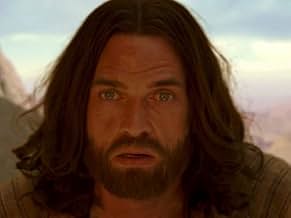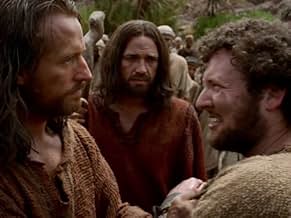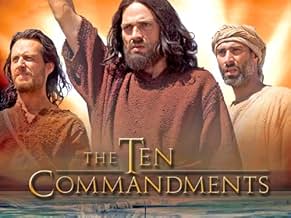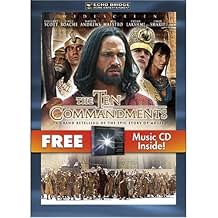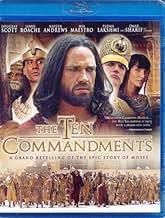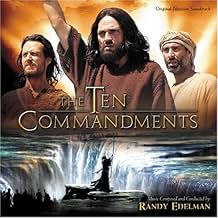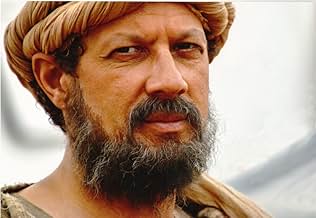CALIFICACIÓN DE IMDb
5.3/10
1.4 k
TU CALIFICACIÓN
Una narración del relato bíblico donde Moisés regresa a Egipto para liberar a los hebreos de la esclavitud.Una narración del relato bíblico donde Moisés regresa a Egipto para liberar a los hebreos de la esclavitud.Una narración del relato bíblico donde Moisés regresa a Egipto para liberar a los hebreos de la esclavitud.
- Nominado a 3 premios Primetime Emmy
- 1 premio ganado y 6 nominaciones en total
Explorar episodios
Opiniones destacadas
It is a honest, fair, correct version. Dry , out of temptation to become spectacular, simple and modest. And , for me, this is just a fundamental virtue.
Because it is the story of Moses and his people a cold, bitter story, a chain of vulnerabilities, incredulity, risks, some madness, descouragements, courage and humbly and not source of magnificent field for special effects. And this film reflects, in more than honorable way, this.
And Dougray Scott is a meritous Moses. Yes, Charlton Heston, like Ben Kingsley were admirable interpreters of this father of his people but Robert Dornhelm and. Geoffrey Madeja are only crafters of a pure and honest remind.
You know so well the story.
They offer only the basic colors of it.
Because it is the story of Moses and his people a cold, bitter story, a chain of vulnerabilities, incredulity, risks, some madness, descouragements, courage and humbly and not source of magnificent field for special effects. And this film reflects, in more than honorable way, this.
And Dougray Scott is a meritous Moses. Yes, Charlton Heston, like Ben Kingsley were admirable interpreters of this father of his people but Robert Dornhelm and. Geoffrey Madeja are only crafters of a pure and honest remind.
You know so well the story.
They offer only the basic colors of it.
I think it's missing the point to expect this to be like DeMille's version. I wasn't crazy about part one, as it didn't seem to know what it was -- epic movie or historical drama. But part two falls more into the historical drama category. There it works much better for me.
The actual story (miracles aside) of how the Israelites became a cohesive people is one that has not often been explored. Haven't watched part two to the end, so can't say if it will disappoint. But I do find the idea of former slaves having to carve their way, battles and all, across the wilderness to be an interesting point of view.
Will say that the character development and some of the acting (in part one) left a lot to be desired. But, again, that seemed to work better in part two. I think looking at this as a story in itself, instead of comparing it to some '50's Hollywood extravaganza, is the fair approach, no matter how it turns out.
The actual story (miracles aside) of how the Israelites became a cohesive people is one that has not often been explored. Haven't watched part two to the end, so can't say if it will disappoint. But I do find the idea of former slaves having to carve their way, battles and all, across the wilderness to be an interesting point of view.
Will say that the character development and some of the acting (in part one) left a lot to be desired. But, again, that seemed to work better in part two. I think looking at this as a story in itself, instead of comparing it to some '50's Hollywood extravaganza, is the fair approach, no matter how it turns out.
Watching this version of the story inspired me to reread the source material, ie the Bible..again. This movie was not about entertainment so much as conveying what I thought was a fair rendering of the original story. Dougray Scott's portrayal seemed more consistent with Moses'uncertainty faced with the task given to him. I have always enjoyed the 1956 film and indeed liked Ben Kingsley's performance in 1996, however this one seemed to convey a "reality" not seen in other versions. It's obviously difficult for modern people to ever comprehend the lives of people 3000 years ago..our roots so to speak...I'm happy I got a chance to see this film, which I would describe as an experience...
Seeing Biblically-based movies makes one wonder if the movie makers cracked open a resource like. . . Oh, let's say the Bible.
They're a bit confusion. The Hebrews boys weren't killed but Pharoah because of a prophecy. That's thousands of years in the future, in the New Covenant's life of Christ. You might recall three Magi appearing before Rome's pal Herod and saying they'd seen a star, and Herod's experts chimed in . . . It's part of the pagentry we use around something called Christmas. You may have heard of it. Unless you live in Hollywood. The Hebrew boys were killed because the Hebrews were being fruitful and multiplying and Pharoah was scared of being outnumbered.
And that's scratching the surface.
The older version of this story had its problems, too, being based on novels. The next time you see it, watch the source materials. Scripture comes last. And Charlton Heston hardly fits Scripture's description of Moses as humble.
Anyhow, like the pre-conversion Augustine of Hippo, folks in Hollywood probably see Scripture as a lot of fairy tales and metaphors (they probably can't tell you what a metaphor is but they know it when they see it. They think.
I'd rather they not make movies and TV shows like this at all if they can't get them right.
They're a bit confusion. The Hebrews boys weren't killed but Pharoah because of a prophecy. That's thousands of years in the future, in the New Covenant's life of Christ. You might recall three Magi appearing before Rome's pal Herod and saying they'd seen a star, and Herod's experts chimed in . . . It's part of the pagentry we use around something called Christmas. You may have heard of it. Unless you live in Hollywood. The Hebrew boys were killed because the Hebrews were being fruitful and multiplying and Pharoah was scared of being outnumbered.
And that's scratching the surface.
The older version of this story had its problems, too, being based on novels. The next time you see it, watch the source materials. Scripture comes last. And Charlton Heston hardly fits Scripture's description of Moses as humble.
Anyhow, like the pre-conversion Augustine of Hippo, folks in Hollywood probably see Scripture as a lot of fairy tales and metaphors (they probably can't tell you what a metaphor is but they know it when they see it. They think.
I'd rather they not make movies and TV shows like this at all if they can't get them right.
This was a mess. The continuity was a mess -half the actors spoke with English accents, King Herod looked like he never saw the sun, and the darkest person was Naveen Andrews who, while a fine actor, seemed out of place. Come on. Finally, out of all the great actors with tremendous voices, (James Earl Jones), the voice of God sounded like the local pizza delivery guy.
One good thing was the special effects and showing the darker side of the story. And the actors though, a little overly dramatic at times, did a pretty good job.
I haven't seen the original in a while, but will check it out this week 2 compare.
One good thing was the special effects and showing the darker side of the story. And the actors though, a little overly dramatic at times, did a pretty good job.
I haven't seen the original in a while, but will check it out this week 2 compare.
¿Sabías que…?
- TriviaThe infant playing baby Moses was named Moses in real life after his mother, an extra in the series, gave birth to him during the making of the series. The director ask her if they could cast him as Moses and she was so honored that she named the baby after him.
- ConexionesReferenced in The Making of 'The Ten Commandments' (2006)
Selecciones populares
Inicia sesión para calificar y agrega a la lista de videos para obtener recomendaciones personalizadas
- How many seasons does The Ten Commandments have?Con tecnología de Alexa
Detalles
- Fecha de lanzamiento
- País de origen
- Sitios oficiales
- Idioma
- También se conoce como
- The Ten Commandments
- Locaciones de filmación
- Productoras
- Ver más créditos de la compañía en IMDbPro
Contribuir a esta página
Sugiere una edición o agrega el contenido que falta


